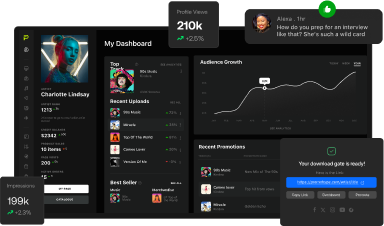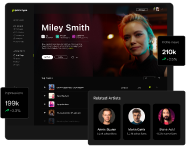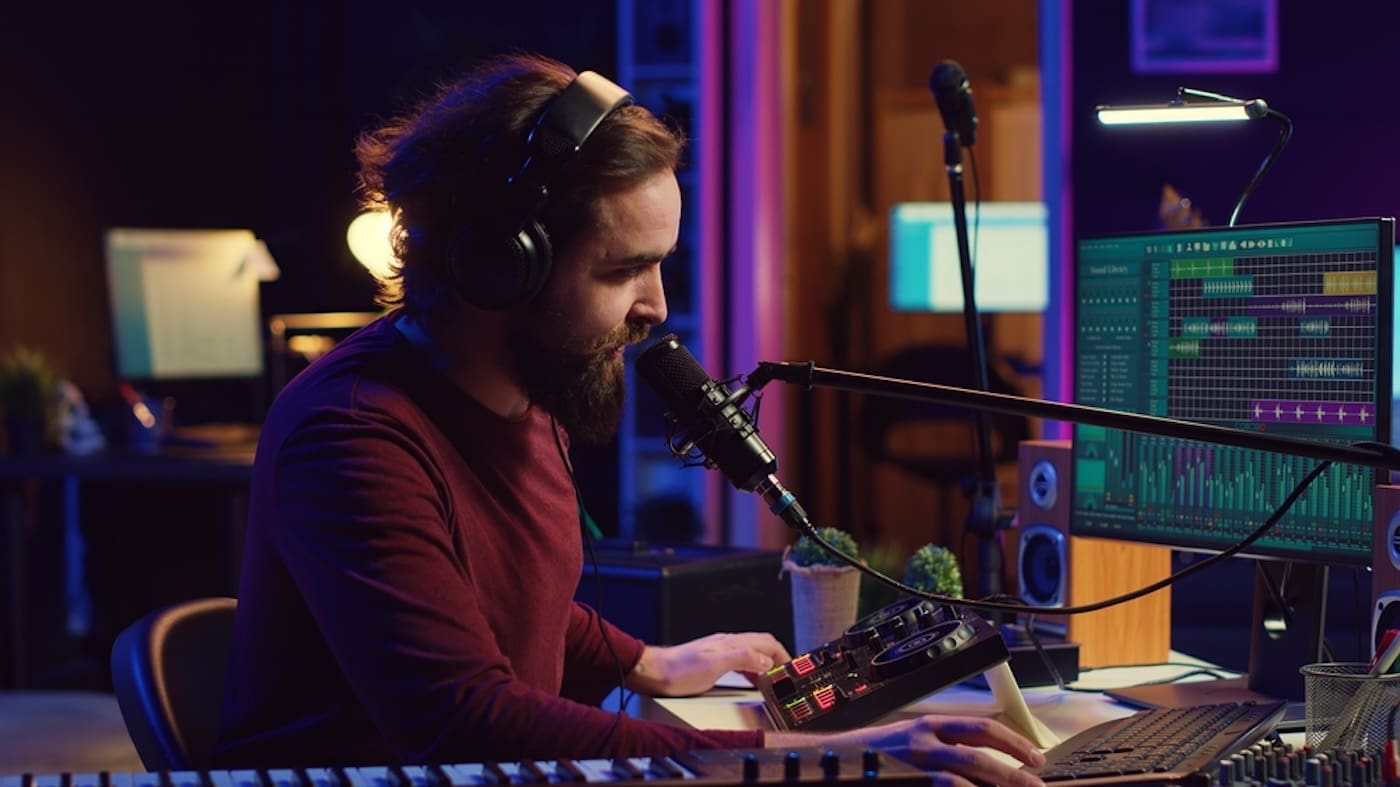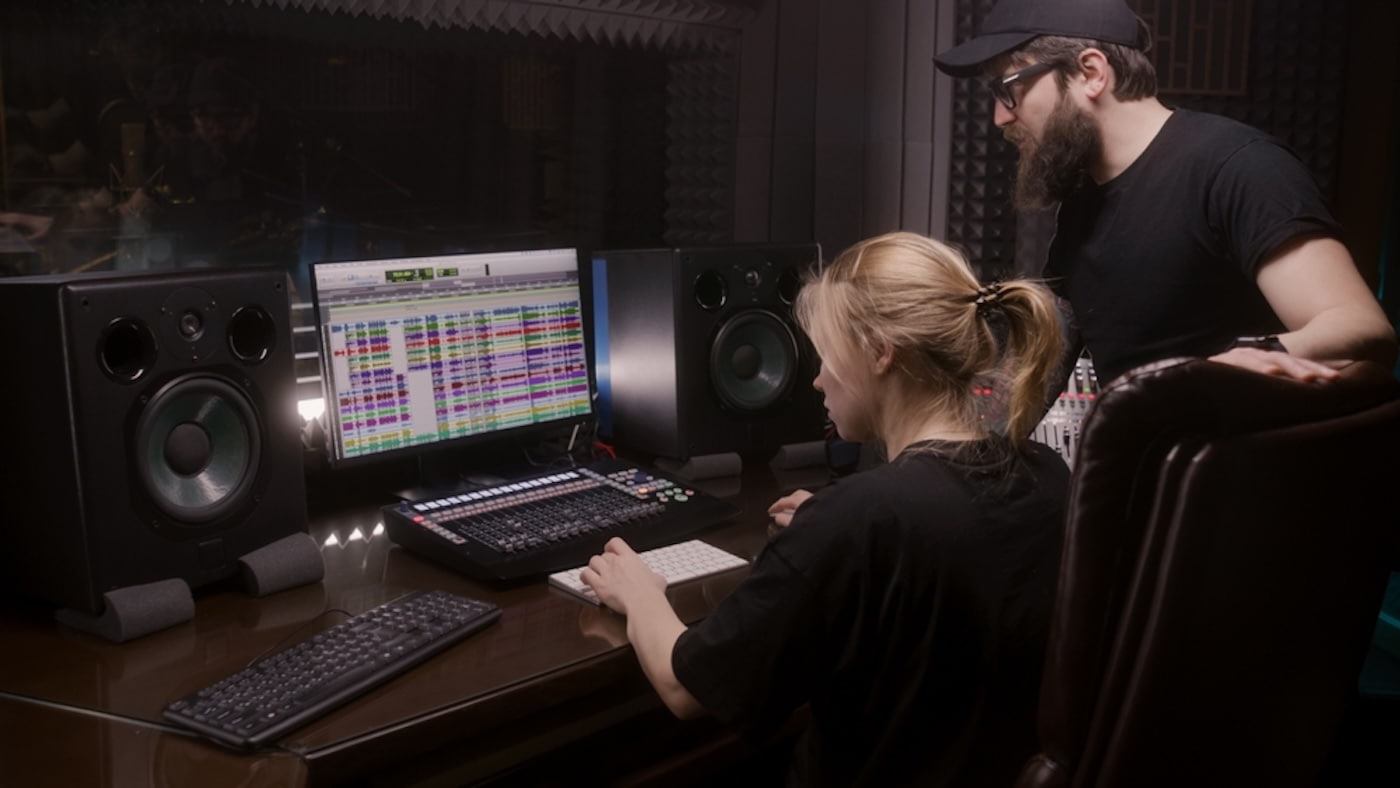
Music marketing is a core aspect of the music business, whether promoting emerging artists or high-profile established acts.
Used to drive awareness and build a dedicated fan base around a recognizable brand, it also drives consistent revenue streams.
This ultimate guide to music marketing breaks down the processes, benefits, and effective promotional strategies you can use to market your music and brand.
Get Early Access
To Promo Hype
Music Marketing 2025: The Definitive Guide For Independent Artists
Building and promoting a brand to generate revenue sits at the heart of music marketing for artists, bands, and producers.
Here’s everything you need to know about marketing your music to achieve creative and professional success.
What Is Music Marketing?
Music marketing is the process of promoting the creative works of songwriters, bands, and music producers.
Once new music has been made, marketing efforts can be initiated to promote the releases across various platforms.
Marketing strategies can also be implemented to highlight upcoming live performances, merchandise releases, and artist collaborations.
It covers everything from digital marketing on social media to television commercials, radio spots, and print media marketing.
By combining these approaches, artists and music producers can generate income through sales, music royalties, and other revenue streams.
Learn more: The ultimate guide to music royalties.
Why Marketing Your Music Is Important
Knowing how to market your music effectively confers numerous benefits that make the effort worthwhile.
Here are some reasons why you should consider implementing a music marketing strategy for your creative works:
Establishing Your Brand
With the music industry expanding, the opportunities for independent artists to share new music releases have never been greater.
To achieve this, artists must establish a recognizable brand that enables audiences to connect with the music in a unique and meaningful way.
Marketing ensures this branding, from the artists’ or band name logo to other visual assets, becomes a key part of their appeal.
Building A Fan Base
With a clear brand in place, marketing strategies can then be used to nurture and grow a dedicated fan base.
By creating a sense of connection on social media platforms and music blogs, artists can write songs that resonate and keep the audience engaged.
Connecting With Music Industry Professionals
As independent musicians gain exposure through marketing, they’re more likely to gain the attention of music industry professionals.
Such exposure can lead to publishing or record label deals that provide access to significantly greater marketing resources.
These organizations help artists promote their work to much larger audiences, further catapulting them toward commercial success.
Generating Revenue Streams
Perhaps the most common function of marketing is revenue generation, and marketing for music relates to various streams.
It can allow artists to earn money from both physical and digital music sales, as well as through live shows and merchandise.
Revenue can then be reinvested in resources that create great music, such as building a recording studio or buying new instruments.
Collaborating With Independent Artists
There is no shortage of high-profile brand collaborations, and the music industry is no exception to this relationship.
Songwriters and producers can reach new audiences, increase visibility, and boost revenue by collaborating with successful independent artists.
These collaborations can then form the basis for new marketing campaigns that leverage their collective online fan base.
Building A Music Career
Ultimately, the core benefit of marketing music is the formation of a viable, long-term music career that allows for creative development.
Successful marketing strategies make it easier for record labels seeking artists to find talent that matches their style.
They can also be used by independent artists who want to retain complete creative control of their brand and future musical direction.
Read next: Music publishing 101.
Key Components Of Music Marketing
As with music production, marketing music incorporates a range of processes that each play a pivotal role in the process.
Let’s break down these components in more detail, from the principal platforms used to the types of ad campaigns.
1. Official Websites & Electronic Press Kits (EPKs)
The first port of call for music bloggers and journalists when reviewing the works of independent musicians is their official website.
This website serves as a showcase of their ability to write and record music that deserves to reach a larger audience.
It includes new songs, high-quality photos, and music videos, with external links to their YouTube channel and social media profiles.
When building anticipation for release day, electronic press kits are used to reach out to the press and generate buzz.
2. Distribution On Streaming Platforms
Music streaming platforms form the backbone of exposure and income for independent musicians and music producers.
Apple Music, Spotify, TIDAL, and other platforms can all be used for performance royalties and to promote upcoming live events.
Independent musicians can utilize music distribution services to distribute their content across various platforms while retaining 100% of the royalties.
3. Promotion On Social Media Outlets
Social media and the music business are inextricably linked, with Facebook, X, TikTok, and Instagram playing a crucial role in driving artists’ success.
Marketing strategies often incorporate social media to reach potential fans, while going viral on TikTok can be a career game-changer.
They’re also excellent platforms where artists can sell merch, generating additional passive income while attracting new fans.
4. Paid Ad Campaigns
If you have the resources to do so, investing in paid ad campaigns can significantly expand your reach and increase your exposure.
Ads can increase your online streams and physical sales, resulting in consistent mechanical and performance royalties.
You can establish metrics and monitor ad performance to ensure your marketing budget is delivering the intended results.
5. High-Quality Content Creation
While it stands to reason that great music is the standout content for musicians and producers, other assets are also needed for marketing.
These can include assets such as music videos and photos from performances, as well as logos and other designs used on releases and merchandise.
It can also feature behind-the-scenes footage, documenting your journey to becoming a music producer and the process of completing tracks.
Get Early Access
To Promo Hype
How To Create A Music Marketing Plan: Step-By-Step
Creating a music marketing plan is crucial for ensuring that any investment yields a worthwhile return.
Here’s a concise step-by-step guide to help you create a marketing plan that delivers results on a budget:
Step 1: Research Your Target Audience
Understanding the interests and habits of your target audience is fundamental to running successful promotional campaigns.
It provides insights into their behaviors, such as their preferred streaming platforms, favorite tracks, and demographics.
You can also learn more about other popular music genres they’re interested in and how this can influence future projects.
By researching your target audience, you can tailor ad campaigns and social media posts to their liking and gain more exposure.
Step 2: Study Similar Artists
Creating successful marketing strategies is easier when you understand what has worked for other artists in the past.
By studying artists within your genre you admire, you can analyze their approach to branding and getting real results.
This research can also help you on a creative level, gaining deeper insights into music theory and other aspects of the craft.
You can put this theory into practice by creating cover songs of these artists and reaching out for potential collaborations.
Step 3: Set Clear & Measurable Goals
Music marketing strategies can be tangibly measured across various metrics, providing valuable insights into your success.
To refine your strategy, these metrics and goals should be clearly defined from the outset, including the tools needed to measure them.
You can establish key performance indicators based on various metrics, including streaming and sales data, as well as social media engagement.
By tracking this data, you can gain insight into which platforms yield the most optimal results for your time and money.
Step 4: Establish A Budget
Music marketing strategies require an initial investment to launch, which means establishing a budget for your campaigns.
When budgeting for marketing, factor in other expenses, such as music production equipment and instrument costs.
If your budget is limited, you can launch smaller-scale test campaigns, using A/B testing to evaluate which assets yield the best results.
Spreading your budget across multiple campaigns can also improve your outcomes and provide you with more data to work with.
Step 5: Implement Your Action Plan
Once your plan is finalized, it’s time to implement it across your chosen platforms and wait for the results to come in.
Be ready to respond to comments and feedback, since this will further drive engagement with your fan base.
You can collect and track performance data using various tools, weighing up the results to streamline your next campaign.
Also read: How to trademark a band name.
Music Marketing Resources
Marketing your music can be complex, with numerous factors to consider that will impact your approach.
These factors range from creating your brand assets to managing your social media pages and responding to comments.
Here are some valuable tools and resources you can use to streamline your workflow when marketing your music:
- Chartmetric: Tracking data is essential for growth, and Chartmetric is an excellent tool that utilizes revolutionary predictive algorithms to aid in this task.
- Google Analytics: A widely used resource for all types of creatives, Google Analytics can deliver additional insights that songwriters and musicians can use to refine their marketing strategies.
- Design and editing tools: If you need to create a logo or edit a music video, platforms like Canva and Capcut include game-changing tools for musicians.
- Social media management tools: Managing social media channels is simplified with specific tools, such as Hootsuite, which can be used for scheduling posts and monitoring comments and likes.
- Digital music distribution services: Uploading multiple tracks to Spotify, Apple Music, and other platforms can be a time-consuming process. Digital music distribution services perform this and other related tasks for you for a monthly subscription fee.
You can use free tools or sign up for trial periods to decide which tools best match your needs and marketing workflow.
Top 3 Best Music Marketing Strategies
Marketing music requires a comprehensive approach to ensure all opportunities for growing an audience and income are seized.
If you’re approaching music marketing for the first time or looking to refine your strategy, here are some examples to consider.
- Take a multi-platform approach: Utilizing all available platforms is vital for any successful marketing campaign, whether for a new release or upcoming gig. In addition to utilizing social media and collaborating with music journalists, consider submitting music to radio stations and podcasts.
- Incorporate live performances: While digital music is experiencing unprecedented growth, the demand for live music remains equally important in marketing strategies. A gig allows fans to meet you in person, creating a strong connection and word of mouth.
- Consistently engage with your audience: On the topic of fan engagement, responding to comments, emails, and other forms of communication is integral to effective marketing. This includes networking with industry professionals to increase your chances of getting gigs and other deals.
By combining different platforms and engaging with constructive feedback, your marketing strategy will deliver optimal results.
Trending: The 10 best music grants for independent artists.
Music Marketing Tips
We’ve covered the essential processes for promoting your music, but here are some additional tips to further enhance your approach:
- Follow music industry trends: Capitalizing on the latest industry trends ensures that your marketing campaigns are in tune with the current state of music culture.
- Pitch to playlist curators: Getting your music featured on curated playlists on Spotify and other editorial playlists can significantly enhance your global reach.
- Create a YouTube channel: If you don’t already have a YouTube channel, setting one up can expand your revenue streams and provide a platform for live performances and music videos.
Experimenting with content and gauging feedback from your fans will ensure these tips elicit the best response.
Summary
Understanding how music marketing works is crucial for musicians and producers to differentiate themselves from the competition.
Whether releasing singles or promoting an upcoming tour, marketing plays a pivotal role in building hype and generating sales.
As you launch new campaigns, you can refine your promotional content to create visually stunning assets that resonate with fans.
Get Early Access
To Promo Hype
Join Promo Hype






